一般过去时一般将来时语法知识及练习题
一般现在时-一般过去时-一般将来时-现在完成时综合练习
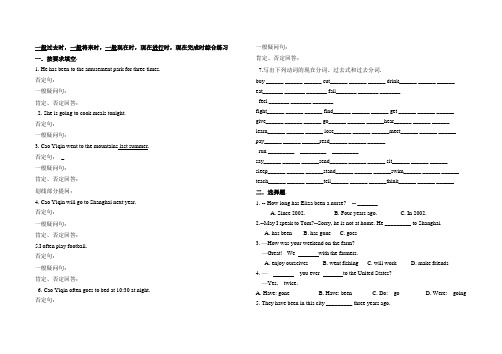
一般过去时,一般将来时,一般现在时,现在进行时,现在完成时综合练习一.按要求填空.1. He has been to the amusement park for three times.否定句:一般疑问句:肯定、否定回答:2. She is going to cook meals tonight.否定句:一般疑问句:3. Cao Yiqin went to the mountains last summer.否定句:_一般疑问句:肯定、否定回答:划线部分提问:4. Cao Yiqin will go to Shanghai next year.否定句:一般疑问句:肯定、否定回答:5.I often play football.否定句:一般疑问句:肯定、否定回答:6. Cao Yiqin often goes to bed at 10:30 at night.否定句:一般疑问句:肯定、否定回答:7.写出下列动词的现在分词、过去式和过去分词.buy ______ ______ ______ cut______ ______ ______ drink______ ______ ______eat_______ _______ _______ fall_______ _______ _______feel _______ _______ _______fight______ ______ ______ find______ ______ ______ get ______ ______ ______ give______ ______ ______ go______ ______ ______hear______ ______ ______learn______ ______ ______ lose______ ______ ______meet______ ______ ______ pay______ ______ ______read______ ______ ______run _________ _________ _________say______ ______ ______send______ ______ ______ sit______ ______ ______sleep______ ______ ______stand______ ______ ______swim______ ______ ______ teach______ ______ ______tell______ ______ ______think______ ______ ______ 二.选择题.1. -- How long has Eliza been a nurse? -- _______A. Since 2002.B. Four years ago.C. In 2002.2.--May I speak to Tom?--Sorry, he is not at home. He _________ to Shanghai.A. has beenB. has goneC. goes3. —How was your weekend on the farm?—Great! We with the farmers.A. enjoy ourselvesB. went fishingC. will workD. make friends4. —you ever to the United States?—Yes, twice.A. Have: goneB. Have: beenC. Do: goD. Were: going5. They have been in this city _________ three years ago.A. forB. aboutC. since6. ―have you been learning English?―I have been learning English for six years.A. How longB. How oftenC. How far7.--Where is Zhang Ming?-- Oh, he _____ to Beijng and he will be back tomorrow.A. has beenB. has goneC. goes8. The Greens____supper now. A:is having B:are;having C:is haveing9.____you usually _____to school with classmates?A. Do, comesB. does, comeC. Do, come10.Mr Green usually______newspapers after supper every day.A. readB. readingC. reads11.______Helen____________(wash )clothes? Yes ,she is .A. Is, washingB. Does , washC. Is, washes12. There ________ a dolphin show in the zoo tomorrow evening.A. wasB. is going to haveC. will haveD. is going to be13. He ________ her a beautiful hat on her next birthday.A. givesB. gaveC. will givingD. is going to giving14. There __________ a meeting tomorrow afternoon.A. will be going toB. will going to beC. is going to beD. will go to be 三.填空题.1.我母亲通常在星期日打扫卫生、洗衣服。
【英语】 过去将来时一般过去时知识点总结复习及练习测试题
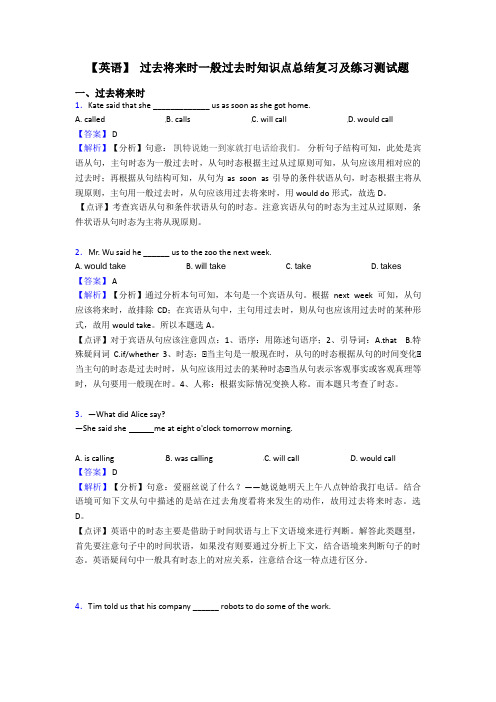
【英语】过去将来时一般过去时知识点总结复习及练习测试题一、过去将来时1.Kate said that she _____________ us as soon as she got home.A. calledB. callsC. will callD. would call【答案】 D【解析】【分析】句意:凯特说她一到家就打电话给我们。
分析句子结构可知,此处是宾语从句,主句时态为一般过去时,从句时态根据主过从过原则可知,从句应该用相对应的过去时;再根据从句结构可知,从句为as soon as引导的条件状语从句,时态根据主将从现原则,主句用一般过去时,从句应该用过去将来时,用would do形式,故选D。
【点评】考查宾语从句和条件状语从句的时态。
注意宾语从句的时态为主过从过原则,条件状语从句时态为主将从现原则。
2.Mr. Wu said he ______ us to the zoo the next week.A. would takeB. will takeC. takeD. takes【答案】 A【解析】【分析】通过分析本句可知,本句是一个宾语从句。
根据next week可知,从句应该将来时,故排除CD;在宾语从句中,主句用过去时,则从句也应该用过去时的某种形式,故用would take。
所以本题选A。
【点评】对于宾语从句应该注意四点:1、语序:用陈述句语序;2、引导词:A.that B.特殊疑问词C.if/whether 3、时态:•当主句是一般现在时,从句的时态根据从句的时间变化‚当主句的时态是过去时时,从句应该用过去的某种时态ƒ当从句表示客观事实或客观真理等时,从句要用一般现在时。
4、人称:根据实际情况变换人称。
而本题只考查了时态。
3.—What did Alice say?—She said she me at eight o'clock tomorrow morning.A. is callingB. was callingC. will callD. would call【答案】 D【解析】【分析】句意:爱丽丝说了什么?——她说她明天上午八点钟给我打电话。
试题专题练习一般过去时和一般将来时(含解析)
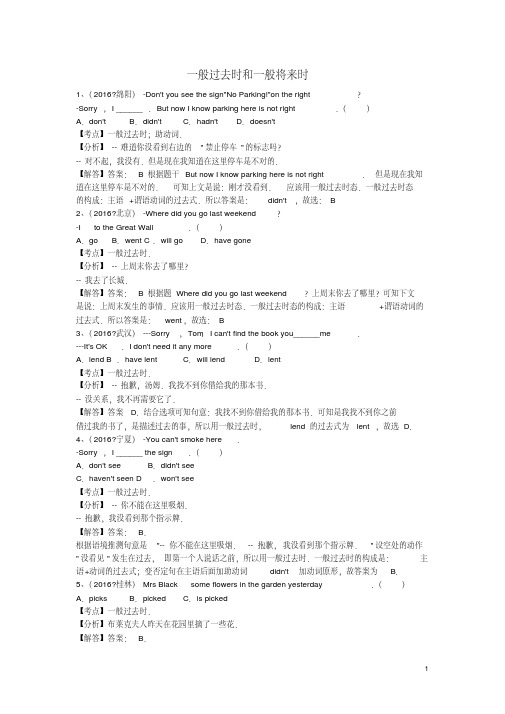
一般过去时和一般将来时1、(2016?绵阳)-Don't you see the sign"No Parking!"on the right?-Sorry,I ______.But now I know parking here is not right.()A.don't B.didn't C.hadn't D.doesn't【考点】一般过去时;助动词.【分析】--难道你没看到右边的"禁止停车"的标志吗?--对不起,我没有.但是现在我知道在这里停车是不对的.【解答】答案: B 根据题干But now I know parking here is not right.但是现在我知道在这里停车是不对的.可知上文是说:刚才没看到.应该用一般过去时态.一般过去时态的构成:主语+谓语动词的过去式.所以答案是:didn't,故选:B2、(2016?北京)-Where did you go last weekend?-I to the Great Wall.()A.go B.went C.will go D.have gone【考点】一般过去时.【分析】--上周末你去了哪里?--我去了长城.【解答】答案: B 根据题Where did you go last weekend?上周末你去了哪里?可知下文是说:上周末发生的事情.应该用一般过去时态.一般过去时态的构成:主语+谓语动词的过去式.所以答案是:went,故选:B3、(2016?武汉)---Sorry,Tom.I can't find the book you______me.---It's OK.I don't need it any more.()A.lend B.have lent C.will lend D.lent【考点】一般过去时.【分析】--抱歉,汤姆.我找不到你借给我的那本书.--没关系,我不再需要它了.【解答】答案D.结合选项可知句意:我找不到你借给我的那本书.可知是我找不到你之前借过我的书了,是描述过去的事,所以用一般过去时,lend的过去式为lent,故选D.4、(2016?宁夏)-You can't smoke here.-Sorry,I ______ the sign.()A.don't see B.didn't seeC.haven't seen D.won't see【考点】一般过去时.【分析】--你不能在这里吸烟.--抱歉,我没看到那个指示牌.【解答】答案:B.根据语境推测句意是"--你不能在这里吸烟.--抱歉,我没看到那个指示牌."设空处的动作"没看见"发生在过去,即第一个人说话之前,所以用一般过去时.一般过去时的构成是:主语+动词的过去式;变否定句在主语后面加助动词didn't加动词原形,故答案为B.5、(2016?桂林)Mrs Black some flowers in the garden yesterday.()A.picks B.picked C.is picked【考点】一般过去时.【分析】布莱克夫人昨天在花园里摘了一些花.【解答】答案:B.1。
一般将来时、一般现在时、一般过去时、正在进行时练习题
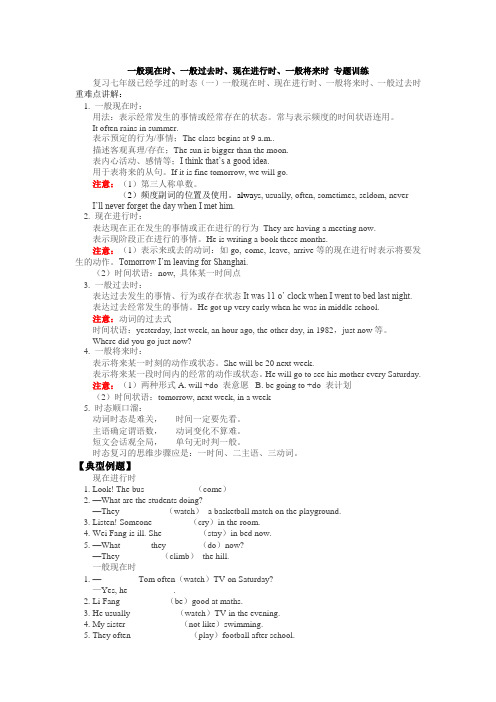
一般现在时、一般过去时、现在进行时、一般将来时专题训练复习七年级已经学过的时态(一)一般现在时、现在进行时、一般将来时、一般过去时重难点讲解:1. 一般现在时:用法:表示经常发生的事情或经常存在的状态。
常与表示频度的时间状语连用。
It often rains in summer.表示预定的行为/事情;The class begins at 9 a.m..描述客观真理/存在;The sun is bigger than the moon.表内心活动、感情等;I think that’s a good idea.用于表将来的从句。
If it is fine tomorrow, we will go.注意:(1)第三人称单数。
(2)频度副词的位置及使用。
alwa ys, usually, often, sometimes, seldom, never I’ll never forget the day when I met him.2. 现在进行时:表达现在正在发生的事情或正在进行的行为They are having a meeting now.表示现阶段正在进行的事情。
He is writing a book these months.注意:(1)表示来或去的动词:如go, come, leave, arrive等的现在进行时表示将要发生的动作。
Tomorrow I’m leaving for Shanghai.(2)时间状语:now, 具体某一时间点3. 一般过去时:表达过去发生的事情、行为或存在状态It was 11 o’ clock when I went to bed last night.表达过去经常发生的事情。
He got up very early when he was in middle school.注意:动词的过去式时间状语:yesterday, last week, an hour ago, the other day, in 1982,just now等。
般过去时、一般将来时语法知识及练习题
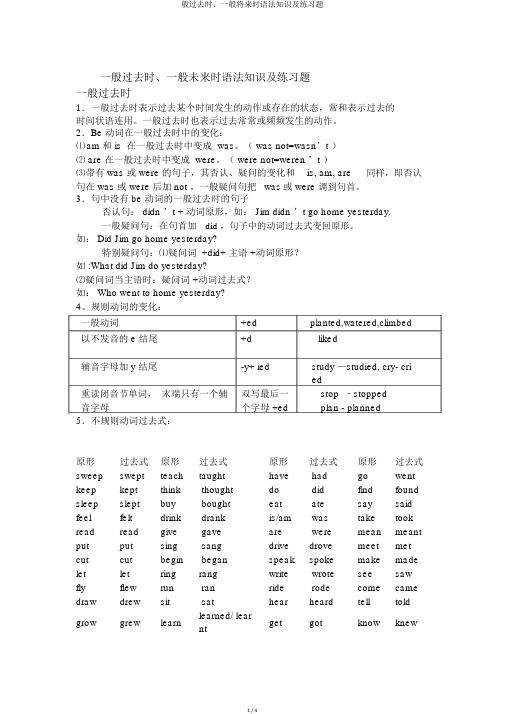
一般过去时、一般未来时语法知识及练习题一般过去时1.一般过去时表示过去某个时间发生的动作或存在的状态,常和表示过去的时间状语连用。
一般过去时也表示过去常常或频频发生的动作。
2.Be 动词在一般过去时中的变化:⑴am 和 is 在一般过去时中变成 was。
( was not=wasn’t )⑵ are 在一般过去时中变成 were。
( were not=weren ’t )⑶带有 was 或 were 的句子,其否认、疑问的变化和is, am, are同样,即否认句在 was 或 were 后加 not ,一般疑问句把was或 were 调到句首。
3.句中没有 be 动词的一般过去时的句子否认句: didn ’t + 动词原形,如: Jim didn ’t go home yesterday.一般疑问句:在句首加did ,句子中的动词过去式变回原形。
如: Did Jim go home yesterday?特别疑问句:⑴疑问词 +did+ 主语 +动词原形?如 :What did Jim do yesterday?⑵疑问词当主语时:疑问词 +动词过去式?如: Who went to home yesterday?4、规则动词的变化:一般动词+ed planted,watered,climbed 以不发音的 e 结尾+d liked辅音字母加 y 结尾-y+ ied study —studied, cry- cried重读闭音节单词,末端只有一个辅双写最后一stop –stopped音字母个字母 +ed plan - planned5.不规则动词过去式:原形过去式原形过去式原形过去式原形过去式sweep swept teach taught have had go went keep kept think thought do did find found sleep slept buy bought eat ate say said feel felt drink drank is/am was take took read read give gave are were mean meant put put sing sang drive drove meet met cut cut begin began speak spoke make made let let ring rang write wrote see saw fly flew run ran ride rode come came draw drew sit sat hear heard tell toldgrow grew learn learned/ learget got know knew nt一般过去时练习一、写出以下动词的过去式is\am_________ fly_______ plant________ are ________drink_________ play_______ go________ make ________does_________ dance________ worry________ ask _____taste_________ eat__________ draw________ put ______throw________ kick_________ pass_______ do ________二、用 be 动词的适合形式填空1. _______ you at school just now? No, I _____ .2. He ________ at the camp last week.3. Yang Ling ________ eleven years old last year.4. There ________ an apple on the plate yesterday.5. There ________ some milk in the fridge on Sunday.6. I ______ an English teacher now.7. Helen and Nancy ________ good friends.8. The little dog _____ two years old this year.9. Look, there ________ lots of grapes here.10. Today _____ the second of June. Yesterday ______ the first of June. It _____ Children ’s Day. All the students ______ very excited.11.He _________ (live) in Wuxi two years ago.12.The cat ________ (eat) a bird last night.13.I ________ (make) a model ship with Mike yesterday.14.The girls ________ (sing) and _______ (dance) at the party.15.Her father _______ (read) a newspaper last night.16.______ you _______ (visit) your relatives last Spring Festival?17.______ he _______ (fly) a kite on Sunday? Yes, he ______.18.I ____________ (sweep) the floor yesterday, but my mother ______.19.What ______ she _______ (find) in the garden last morning? She__________ (find) a beautiful butterfly.20. She likes ______ newspapers, but she ______ a book yesterday. (read)21. He _______ football now, but they _______ basketball just now. (play)22. Jim ’s mother _________ (plant) t rees just now.23._______ they ________ (sweep) the floor on Sunday? No, they _____.24.We ___________ (go) to school on Sunday.25.It _____ (be) the 2nd of November yesterday. Mr White ________ (go)to his office by car.26.Gao Shan ________ (put) the book on his head a moment ago.27.Don ’t ______ the house. Mum _______ it yesterday. (clean)28.What ____ you ______ just now? I _______ some housework. (do)29.I want to ______ apples. But my dad _______ all of them last month. (pick)30.The students often _________ (draw) some pictures in the art room.四、一般未来时表示将要发生的动作或存在的状态及打算、计划或准备做某事。
过去将来时一般过去时单元练习题(含答案)经典
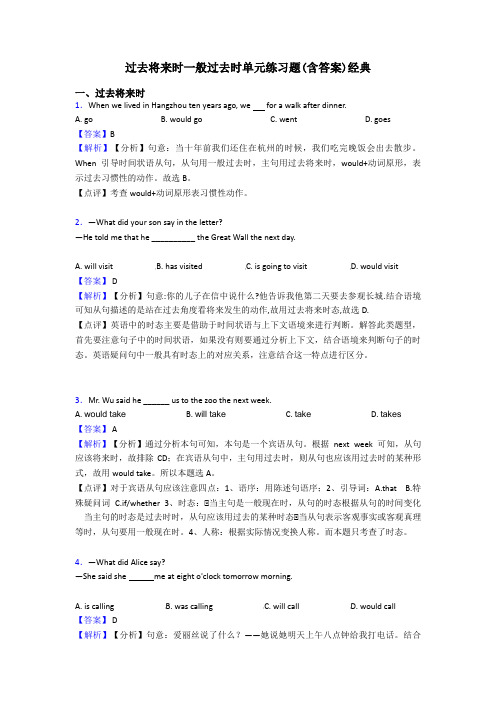
过去将来时一般过去时单元练习题(含答案)经典一、过去将来时1.When we lived in Hangzhou ten years ago, we for a walk after dinner.A. goB. would goC. wentD. goes【答案】B【解析】【分析】句意:当十年前我们还住在杭州的时候,我们吃完晚饭会出去散步。
When引导时间状语从句,从句用一般过去时,主句用过去将来时,would+动词原形,表示过去习惯性的动作。
故选B。
【点评】考查would+动词原形表习惯性动作。
2.—What did your son say in the letter?—He told me that he __________ the Great Wall the next day.A. will visitB. has visitedC. is going to visitD. would visit【答案】 D【解析】【分析】句意:你的儿子在信中说什么?他告诉我他第二天要去参观长城.结合语境可知从句描述的是站在过去角度看将来发生的动作,故用过去将来时态,故选D.【点评】英语中的时态主要是借助于时间状语与上下文语境来进行判断。
解答此类题型,首先要注意句子中的时间状语,如果没有则要通过分析上下文,结合语境来判断句子的时态。
英语疑问句中一般具有时态上的对应关系,注意结合这一特点进行区分。
3.Mr. Wu said he ______ us to the zoo the next week.A. would takeB. will takeC. takeD. takes【答案】 A【解析】【分析】通过分析本句可知,本句是一个宾语从句。
根据next week可知,从句应该将来时,故排除CD;在宾语从句中,主句用过去时,则从句也应该用过去时的某种形式,故用would take。
所以本题选A。
【点评】对于宾语从句应该注意四点:1、语序:用陈述句语序;2、引导词:A.that B.特殊疑问词 C.if/whether 3、时态:•当主句是一般现在时,从句的时态根据从句的时间变化 当主句的时态是过去时时,从句应该用过去的某种时态ƒ当从句表示客观事实或客观真理等时,从句要用一般现在时。
【英语】过去将来时一般过去时-知识点归纳与练习经典1

【英语】过去将来时一般过去时-知识点归纳与练习经典1一、过去将来时1.He after supper a couple of years ago.A. smokedB. would smokeC. smokesD. will smoke【答案】B【解析】【分析】句意:几年前他吃完饭就吸烟。
a couple of years ago是过去时的时间状语,吸烟是吃完饭之后发生的事情,would+过去原形,表示过去习惯性的动作。
故选B。
【点评】考查would+动词原形表习惯性动作。
2.Mr. Wu said he ______ us to the zoo the next week.A. would takeB. will takeC. takeD. takes【答案】 A【解析】【分析】句意:吴老师说他下周会带我们去动物园。
在这个句子中,said 后面跟的是一个宾语从句,从句中的时态是由主句决定的。
主句中said 用的是过去时,故宾语从句中也需用过去时态。
the next week 下周,是一个将来的时间。
故应该用过去将来时。
故选A。
【点评】考查动词时态。
3.I didn't know when he _____ back. He said he would call me when he _____ home.A. would come, gotB. came, gotC. will come, getsD. came, would get【答案】 B【解析】【分析】句意为:我不知道他什么时候回来。
他说他一回来就给我打电话。
前句是when引导的宾语从句,根据语境应用一般过去时。
后句是when引导的时间状语从句,主句用过去将来时,从句用一般过去时。
故选B。
【点评】考查从句的时态。
4.—What did the teacher say to you just now?—She asked _______.A. where did I buy the dictionaryB. where I bought the dictionaryC. where do I buy the dictionaryD. where I buy dictionary【答案】 B【解析】【分析】考查宾语从句。
初中英语语法一般现在时、将来时、过去时讲解及练习题
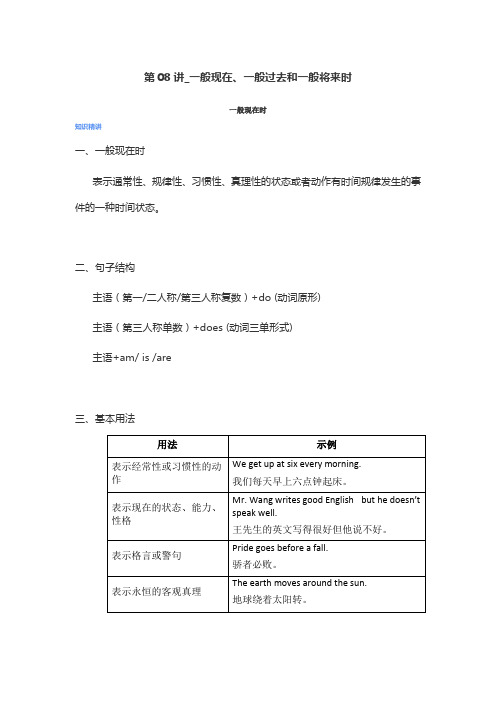
一般现在时知识精讲一、一般现在时表示通常性、规律性、习惯性、真理性的状态或者动作有时间规律发生的事件的一种时间状态。
二、句子结构主语(第一/二人称/第三人称复数)+do (动词原形)主语(第三人称单数)+does (动词三单形式)主语+am/ is /are三、基本用法四、时间状语1. 表示频率的副词: always, usually, often, sometimes, never, hardly, seldom…2. every/once+名词: every day/ week/ year, once a week/ month …3. 表示时间的短语: twice a day, on weekends, on Mondays…五、一般现在时动词三单的变化规律六、相关句式三点剖析一、考点:时态是英语学习中的核心内容之一,是英语学习的基础。
自然,时态考查是各种英语考试尤其是中考时的座上宾。
动作发生的时间决定时态,时态决定动词的形式,而考卷中的时态题通常没有给出明确的时间标志词,考试需领悟所提供的语境来做出判断。
只有推断出动作发出的正确时间,才可能正确答题,这就要求考生在熟练掌握时态结构、用法并牢记常用的时间状语的基础上,要充分利用上下文中隐含的信息来捕捉时间,找准答题的突破口。
二、重难点:一般现在时在考试中的重难点是:句子结构、基本用法、标志时间状语、动词三单的变化规则及相关句式的变化。
三、补充点:1. 表示按计划或安排好的,或将要发生的动作,可用一般现在时表将来。
但只限于start, begin, leave, go, come, arrive, return, take place等。
例:My train leaves at 7:00 this afternoon.我乘坐的火车将在今天下午7点离开。
2. 在复合句中,当主句是一般将来时,时间或条件状语从句的谓语动词只能用一般现在时来表示将来要发生的动作。
一般现在时、现在进行时、一般将来时、一般过去时专项练习
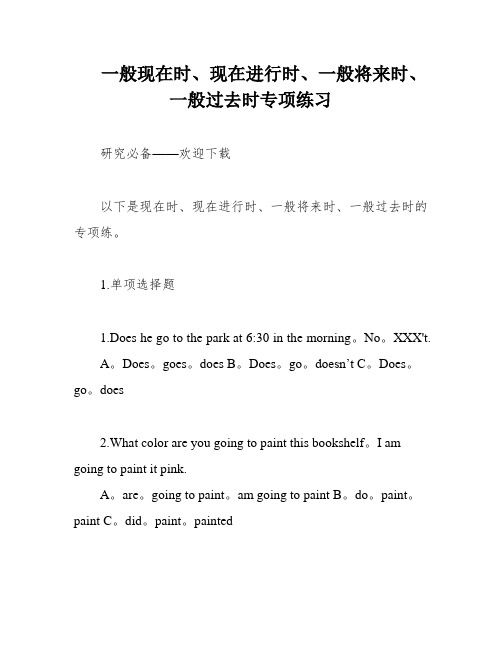
一般现在时、现在进行时、一般将来时、一般过去时专项练习研究必备——欢迎下载以下是现在时、现在进行时、一般将来时、一般过去时的专项练。
1.单项选择题1.Does he go to the park at 6:30 in the morning。
No。
XXX't.A。
Does。
goes。
does B。
Does。
go。
doesn’t C。
Does。
go。
does2.What color are you going to paint this bookshelf。
I am going to paint it pink.A。
are。
going to paint。
am going to paint B。
do。
paint。
paint C。
did。
paint。
painted3.Tim always draws a picture at home。
He is drawing a car now.A。
draws。
is drawing B。
draw。
draw C。
draws。
draw4.XXX.A。
see。
drink B。
sees。
drinks C。
sees。
drink5.XXX。
XXX.A。
wash。
XXX。
XXX washing。
washes6.Mr。
Green usually reads his XXX。
XXX with his wife.A。
reads。
watches B。
reads。
will watch C。
reads。
watched7.Where are the man and the woman。
They are sitting near the tree.A。
XXX sitting8.Is your pen pal into diving。
No。
he isn't。
He is into writing stories.A。
Is。
into。
isn't。
is9.Did you go fishing yesterday。
一般现在时,过去时,将来时 练习题解析

一般现在时、一般过去时、一般将来时——练习题答案解析一星题1.go解析:早上七点上班是一件经常做的事,所以是一般现在时。
We是复数,所以用go。
2.read解析:last night是昨晚,是一般过去时的标志词,read的过去式还是read。
3.Swept,didn’t解析:yesterday是一般过去时的标志词,所以用sweep的过去式,是swept,but表示转折,意味着我拖地板了但是妈妈没有,所以第二空填表示否定的,只有一个空,所以用助动词,didn’t。
4.Did,do,did解析:just now解释为刚才,是一般过去时标志词,所以是did,do,did。
5.Didn’t do解析:一般过去时否定句结构是didn’t do,原句中的动词过去式在加上didn’t之后变成原型,did就变为do。
6.Did,find,any解析:一般过去时一般疑问句的句子结构是Did+主语+do…?所以found变为find,some 变为any。
7.D解析:free是形容词,所以是be free,tomorrow是将来时标志词,所以前半句是Are you going to be free tomorrow?后半句把be going to换成了will。
所以是will be。
8.C解析:next week是将来时的标志词,there be句型表示“什么时候/什么地方有什么”,这里的有不需要再用have,所以是is going to be或者will be。
选择C。
两星题1.C解析:这里的Shall I表建议,如果是拒绝的回答就用No,please don’t。
2.C解析:in three days,在三天内,表将来,所以是C。
3.A解析:学好英语需要一段很长的时间,这是一个客观事实,所以用一般现在时。
所以选A。
4.Did,water;watered解析:this morning是已经过去了的今天早晨,所以是过去时,所以用Did,water,water 过去式直接加ed。
【英语】过去将来时一般过去时知识点总结和题型总结
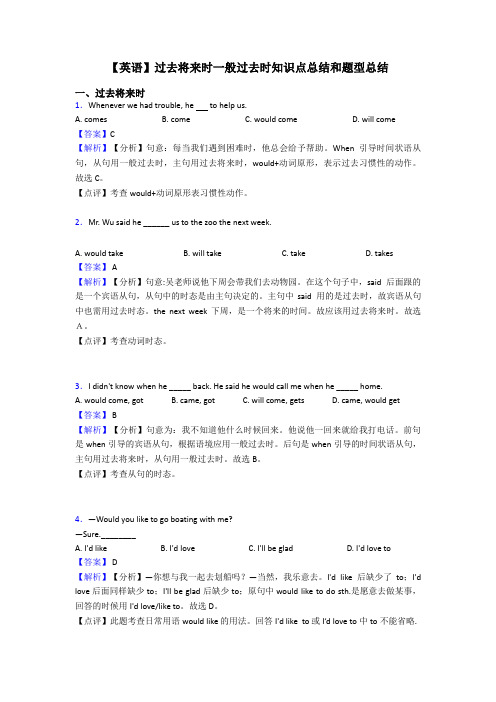
【英语】过去将来时一般过去时知识点总结和题型总结一、过去将来时1.Whenever we had trouble, he to help us.A. comesB. comeC. would comeD. will come【答案】C【解析】【分析】句意:每当我们遇到困难时,他总会给予帮助。
When引导时间状语从句,从句用一般过去时,主句用过去将来时,would+动词原形,表示过去习惯性的动作。
故选C。
【点评】考查would+动词原形表习惯性动作。
2.Mr. Wu said he ______ us to the zoo the next week.A. would takeB. will takeC. takeD. takes【答案】 A【解析】【分析】句意:吴老师说他下周会带我们去动物园。
在这个句子中,said 后面跟的是一个宾语从句,从句中的时态是由主句决定的。
主句中said 用的是过去时,故宾语从句中也需用过去时态。
the next week 下周,是一个将来的时间。
故应该用过去将来时。
故选A。
【点评】考查动词时态。
3.I didn't know when he _____ back. He said he would call me when he _____ home.A. would come, gotB. came, gotC. will come, getsD. came, would get【答案】 B【解析】【分析】句意为:我不知道他什么时候回来。
他说他一回来就给我打电话。
前句是when引导的宾语从句,根据语境应用一般过去时。
后句是when引导的时间状语从句,主句用过去将来时,从句用一般过去时。
故选B。
【点评】考查从句的时态。
4.—Would you like to go boating with me?—Sure.________A. I'd likeB. I'd loveC. I'll be gladD. I'd love to【答案】 D【解析】【分析】—你想与我一起去划船吗?—当然,我乐意去。
八大时态练习题
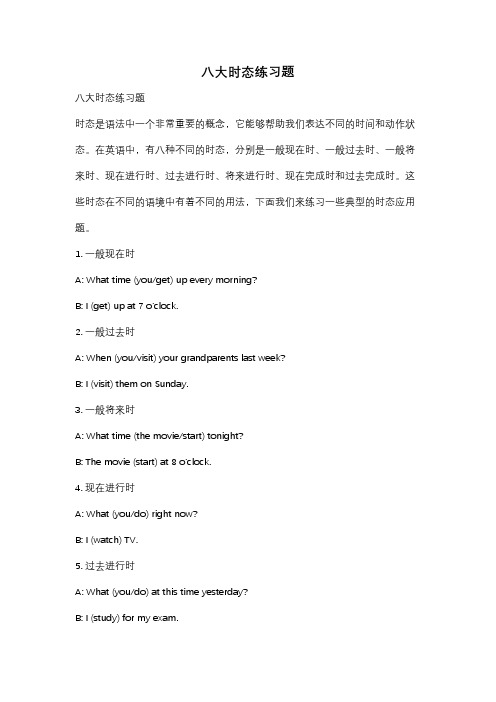
八大时态练习题八大时态练习题时态是语法中一个非常重要的概念,它能够帮助我们表达不同的时间和动作状态。
在英语中,有八种不同的时态,分别是一般现在时、一般过去时、一般将来时、现在进行时、过去进行时、将来进行时、现在完成时和过去完成时。
这些时态在不同的语境中有着不同的用法,下面我们来练习一些典型的时态应用题。
1. 一般现在时A: What time (you/get) up every morning?B: I (get) up at 7 o'clock.2. 一般过去时A: When (you/visit) your grandparents last week?B: I (visit) them on Sunday.3. 一般将来时A: What time (the movie/start) tonight?B: The movie (start) at 8 o'clock.4. 现在进行时A: What (you/do) right now?B: I (watch) TV.5. 过去进行时A: What (you/do) at this time yesterday?B: I (study) for my exam.6. 将来进行时A: What (you/do) this time tomorrow?B: I (work) on a project.7. 现在完成时A: How many books (you/read) so far this year?B: I (read) ten books.8. 过去完成时A: By the time I arrived, they (already/leave).B: Oh no, I (miss) them.这些练习题涵盖了八种不同的时态,让我们更好地理解和掌握它们的用法。
一般现在时用于描述经常性的动作或事实,一般过去时用于过去发生的动作或事情,一般将来时用于表示将来的动作或计划,现在进行时用于描述正在进行的动作,过去进行时用于过去某个时间正在进行的动作,将来进行时用于描述将来某个时间正在进行的动作,现在完成时用于描述过去发生的动作对现在造成的影响,过去完成时用于描述过去某个时间之前已经完成的动作。
英语专题练习一般过去时和一般将来时(含解析)

一般过去时和一般将来时1、(2016?武汉)---Sorry,Tom.I can't find the book you______me.---It's OK.I don't need it any more.()A.lend B.have lent C.will lend D.lent【考点】一般过去时.【分析】--抱歉,汤姆.我找不到你借给我的那本书.--没关系,我不再需要它了.【解答】答案D.结合选项可知句意:我找不到你借给我的那本书.可知是我找不到你之前借过我的书了,是描述过去的事,所以用一般过去时,lend的过去式为lent,故选D.2、(2016?随州)My h usband always ______me f lowers every week before we got married,but now he never______.A.sent;does B.sends;doesC.was going to send;do D.sent;do【考点】一般过去时.【分析】在我们结婚之前,我丈夫总是每周送花给我,但是现在他再也不这样做了.【解答】答案: A 根据第一句的时间状语"every week before we got married"可知时态为一般过去时.send的过去式为sent.根据第二个空的时间now,可知用一般现在时.主语he为第三人称单数,故用does.故选A.3、(2016?黄石)Many scientists believe that robots ______ able to talk like humans in 50years.()A.were B.are C.will be D.have been【考点】一般将来时.【分析】许多科学家认为五十年后机器人能和人类一样进行交谈.【解答】答案:C.本题考查的是动词的时态,根据题干in 50 years可知这是表示将来时间的时间短语,应该用一般将来时,其结构是will+动词原形,故选 C4、(2016?咸宁)--I don't know if it _________tomorrow.--Well,if it __________,the school sports meet will be canceled.()A.will rain; will rain B.rains; will rainC.will rain; rains D.rains; rains【考点】一般将来时;一般现在时.【分析】--我不知道明天是否会下雨.--哦,如果明天下雨的话,校运动会将被取消.【解答】答案:C.根据I don't know if it _________tomorrow,可知这里if是"是否"的意思,引导的是宾语从句,根据宾语从句的时态的用法,主句是一般现在时,从句应该根据自身的时间决定时态,又因为tomorrow,所以应该用will rain;再根据if it __________,the school sports meet will be canceled,可知这里if是"如果",引导的是条件状语从句,条件状语从句的时态用法是"主将从现",故用rains.故选 C5、(2016?十堰)-I heard your father gone to Beijing on business.-Yes,And he_____in three weeks.()A.will return B.has returnedC.returned D.returns1。
(完整版)初一英语各种时态复习及练习题
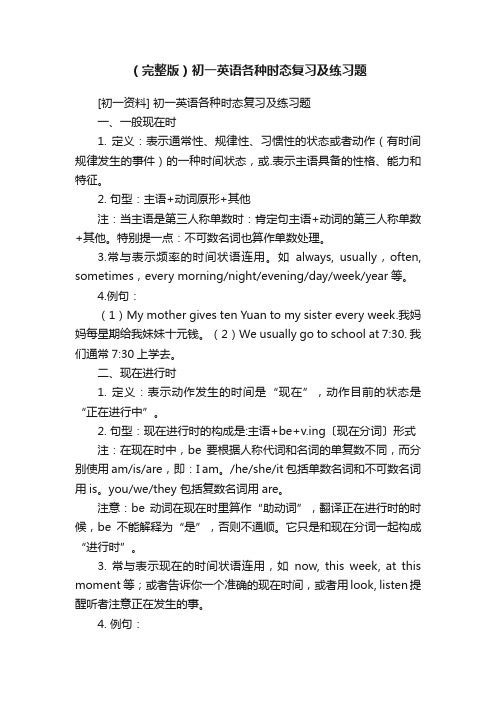
(完整版)初一英语各种时态复习及练习题[初一资料] 初一英语各种时态复习及练习题一、一般现在时1. 定义:表示通常性、规律性、习惯性的状态或者动作(有时间规律发生的事件)的一种时间状态,或.表示主语具备的性格、能力和特征。
2. 句型:主语+动词原形+其他注:当主语是第三人称单数时:肯定句主语+动词的第三人称单数+其他。
特别提一点:不可数名词也算作单数处理。
3.常与表示频率的时间状语连用。
如always, usually,often, sometimes,every morning/night/evening/day/week/year等。
4.例句:(1)My mother gives ten Yuan to my sister every week.我妈妈每星期给我妹妹十元钱。
(2)We usually go to school at 7:30. 我们通常7:30上学去。
二、现在进行时1. 定义:表示动作发生的时间是“现在”,动作目前的状态是“正在进行中”。
2. 句型:现在进行时的构成是:主语+be+v.ing〔现在分词〕形式注:在现在时中,be 要根据人称代词和名词的单复数不同,而分别使用am/is/are,即:I am。
/he/she/it 包括单数名词和不可数名词用is。
you/we/they 包括复数名词用are。
注意:be 动词在现在时里算作“助动词”,翻译正在进行时的时候,be不能解释为“是”,否则不通顺。
它只是和现在分词一起构成“进行时”。
3. 常与表示现在的时间状语连用,如now, this week, at this moment 等;或者告诉你一个准确的现在时间,或者用look, listen提醒听者注意正在发生的事。
4. 例句:(1)They are playing basketball now.现在他们正在打篮球。
(2)Listen! She is singing a song.听,她正在唱歌。
一般现在时、一般过去时、一般将来时
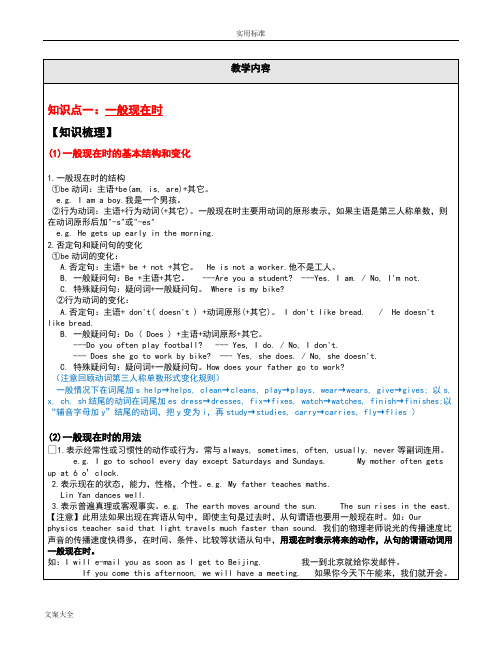
教学内容知识点一:一般现在时【知识梳理】(1)一般现在时的基本结构和变化1.一般现在时的结构①be动词:主语+be(am, is, are)+其它。
e.g. I am a boy.我是一个男孩。
②行为动词:主语+行为动词(+其它)。
一般现在时主要用动词的原形表示,如果主语是第三人称单数,则在动词原形后加"-s"或"-es"e.g. He gets up early in the morning.2.否定句和疑问句的变化①be动词的变化:A.否定句:主语+ be + not +其它。
He is not a worker.他不是工人。
B. 一般疑问句:Be +主语+其它。
---Are you a student? ---Yes. I am. / No, I'm not.C. 特殊疑问句:疑问词+一般疑问句。
Where is my bike?②行为动词的变化:A.否定句:主语+ don't( doesn't ) +动词原形(+其它)。
I don't like bread. / He doesn'tlike bread.B. 一般疑问句:Do ( Does ) +主语+动词原形+其它。
---Do you often play football? --- Yes, I do. / No, I don't.--- Does she go to work by bike? --- Yes, she does. / No, she doesn't.C. 特殊疑问句:疑问词+一般疑问句。
How does your father go to work?(注意回顾动词第三人称单数形式变化规则)一般情况下在词尾加s help→helps, clean→cleans, play→plays, wear→wears, give→gives; 以s, x, ch, sh结尾的动词在词尾加es dress→dresses, fix→fixes, watch→watches, finish→finishes;以“辅音字母加y”结尾的动词,把y变为i,再study→studies, carry→carries, fly→flies )(2)一般现在时的用法1.表示经常性或习惯性的动作或行为。
一般现在时、一般过去时、现在进行时、现在完成时、过去完成时、过去将来时、一般将来时初中全部时态练习题

时态专项复习(一般现在时、现在进行时、一般过去时)一、用动词的正确形式填空1. I ________ (do) my homework every evening.2. We _______ (fly) kites in the park on Sundays.3. My mother _____________ (clean) our room on Sundays.4. Tom ____________(play) the piano every Saturday. Now he____________ (play).5. She ___________(like) swimming. She _____________ (swim) last weekend.6. Usually my mother _______________ (wash) the dishes after lunch. But my grandma _____________ (wash) today.7. Look at the man! He ____________ (read) a magazine.8. Look! The plane ______________ (fly) over the building.9. Listen! My aunt ______________ (sing) in the room.She is a singer. She __________ (like) singing. She _____________(have) a music show. She is excited.10. Tom and Mike always ______________ (swim) in the river. They ___________ (swim) in the swimming pool three days ago. Look! They ________________ (swim).11. What ____ you usually ______ (do) in the evening? I ______ (play) computer games.12. What _______ you _______ (do) now? I __________ (make) a paper plane.13. What _______ he _______ (do) now? He _____________ (dance).14. What _______ she ______ (do) yesterday? She ______ (visit) her grandparents.15. ______ your mother ______ (read) newspaper in the morning? Yes, She ________ .16. _______ you _______ (like) fishing? No, I ______ . I like __________ (swim), but my brother___________ (like).17. How ______ your father _______ (go) to work every day? He _________ (go) by bike. But itcold today. He ___________ (take) the No.21 bus,, and he ____________ (go) to work by taxi yesterday.18. _______ the monkey _______ (like) climbing trees? Yes, it _______ .19. What _______ your father ______ (do) after lunch? He _______ (read) a comic book. What_____ he _______(do) today? He _______ (clean) the kitchen for my grandma. Look! He (clean).20. ________ you ______ (collect) stamps? Yes. I _______ . ________ your brother ______ (collect), too? No, he ________ .二、选择题1. _____ he _____ to the park at 6:30 in the morning? No,he _____ .C. Does; go; doesA. Does; goes; doesB. Does; go; doesn’t2. What colour _____ you _____ this bookcase? I _____ it pink.A. are; going to paint; am going to paintB. do; paint; paintC. did; paint; painted3. Tim always _____ a picture at home. He _____ a car now.A. draws; is drawingB. draw; drawC. draws; draw4. She usually _____ her friends. They often _____ tea.A. see; drinkB. sees; drinksC. sees; drink5. He usually _____ the dishes at night, but tonight he _____ clothes.A. wash; washB.washes; is going to washC. is washing; washes6. Mr. Green usually _____ his newspaper in the evening, but he and his wife _____ television yesterday evening.A.reads; watchesB.reads; is going to watchC.reads; watched7. Where are the man and the woman? They _____ near the tree.A. sitB. satC. are sitting8. _____ your penpal _____ diving? No, he _____ .He ______ writing stories.C. Do; like; don’t; likesB.Does; likes; doesn’t; likeA. Does; like; doesn’t; likes9. _____ you _____ fishing yesterday? No, we _____ .C. Do; go; don’tA. Does; go; doesn’tB. Did; go; didn’t10. Open the window, Please. Look! He _____ it.A. opensB. is openningC. is opening11. I usually _____ some milk every day. But I _____ coffee yesterday.A. drink; drankB. is drinking; drinkC. drank; am drinking12. Mr. Green often __ his newspapers at night. But he ___ an interesting book tonight.A. reads; readsB. reads; readC. reads; is going to read13. The old man _____ playing sports in the park. He _____ morning exercise now.A. likes; is doingB. likes; doesC. like; doing14. What _____ you usually _____ in the evening? I ______ computer games.What _____ you _____ last night? I _____ a book.A. do; do; play; did; do; readB. did; do; played; do; do; readC. does; do; plays; do; do; am reading15. Where ______ the boy _____ ? He _____ across the river now.A. does; swim; swimsB. is; swimming; is swimming D. is; swimming; is swimming16. _____ you _____ to music now? Yes, we _____ .A. Do; listen; doB. Did; listen; didC. Are; listening; are17. Put on you coat, please. OK. I ___ it on. A. am putting B. am going to put C. put18. _____ you ______ coffee? Yes, I ______ .A. Do; like; doB. Did; like; didC. Are; like; am19. Look! Two cats ______ across the wall. A. run B. runs C. are runningC. like; doesn’t20. She ____ tea, but he ___ . A. likes; doesn’tB; like; don’t21. ---How many ________ in the tree? ---There are two.A. bird are therB. birds is therC. birds are thereD.birds are their22.. Mr Johnson usually goes to the hospital ________.A. by his carB. by the black carC. by carD. by the new car23. Does your brother play ping-pong __________?A. on every afternoonB. every afternoonC. in every afternoonD. at every afternoon24. ________ do you usually come to school? A. How B. What C. Which D. How much25. ---Don’t you us ually come to school by bike? ---_________. But I sometimes walk.C. Yes, I doD. No, I don’tA. Yes, I doB. No, I don’t26. What ____ Tom and his mother like ? A. does B. do C. is D. are27. What’s your hobby? My hobby is ______ model pl ane.A. makingB. makeC. makingD. made28. ---Did you go to the park on Sunday morning? ---___, I went there in the afternoon.A. YesB. NoC. SureD. Sorryare29. I don’t think he’s so great, but my mom _________. A. do B. does C. is D.30. A kid ______ breakfast every morning, because it’s good for his health.A. have toB. has toC. has to haveD. has to has现在完成时态练习题1. All the furniture in the building _______ to the company not to his own.A. is belonged B belongs C. belong D are belonged2. When I was at college I _______ three foreign languages, but I _______ all except a few words of each.A. spoke, had forgotten B spoke, have forgotten C had spoken, had forgotten D had spoken, have fo rgotten3. -----We would have walked to the station. It was so near.----- Yes, a taxi _______ at all necessary.be D won’tbeen C wouldn’tbeB hadn’tA wasn’treally work here. I _______ until the new secretary arrives.4. I don’tA just help outB have just helped outC am just helping outD will just help out5. He _______ his leg when he _______ in a football match.A broke, playedB was breaking, was playingC broke, was playingD was breaking, played6. The new secretary is supposed to report to the manager as soon as she _______.A will arriveB arrivesC is going to arriveD is arriving7. As she _______ newspaper, Granny _______ asleep.A read, was fallingB was reading, fellC was reading , was fallingD read, fall8. ---Do you like the material?---Yes, it _______ very soft.A is feelingB feltC feelsD is felt9. ---Come on in, Tom. I want to show you something.--- Oh, how nice of you! I _______ you _______ to bring me a gift.think , were goingA never think, are goingB never thought, were goingC didn’tthought , were goingD hadn’tyou getting ready?10. ----You’ve agreed to go, so why aren’t----But I _______ that you _______ us to start at once.realize, wantedrealized, want D didn’t realize, want B don’tA don’trealize, wanted C haven’t11. The house is dirty. We _______it for weeks.cleanedcleaned C don’tclean D haven’tA didn’tclean B hadn’t12. -----_______ the sports meet might be put off.---- Yes, it all depends on the weather.A I’ve been toldB I’ve toldC I’mtoldD I told13. ---- I’msorry to keep you waiting.----Oh, not at all. I _______ here only a few minutes.A have beenB had beenC wasD will beneed to describe her. I _______ her several times.14. You don’tA. had met B have met C met D meet15. The cost of living _______ by ten percent before the government took any action.A was goingB went upC had gone upD has gone up16. By the time new pupil _______ enough courage to raise his hand , the bell for the end of the les son _______.A had gathered ; was already ringingB was gathering ; had already rungC gathered ; already rangD would gather ; would already have rung17. -----Did you go to Beijing for vacation ?-----I _______ to go , but I got sick at the last minute.A was planningB have plannedC had been planningD have been planning18. ------When will they leave ?------They _______ very soon .A do leaveB are leavingC have leftD leave19. ------Was he studying for an exam ?------Yes , he's _______ it next week.A doingB to takeC makingD to give20. ------Are there going to be many people at your party today ?------We hope that _______.A there will beB there are goingC there areD there going to be21. She must have arrived there last night , _______ she ?A didn'tB haven'tC needn'tD mustn't22. _______ the letter , I ran out of the room to the post office.A Since I have finished writingB No sooner than I had finished writingC As soon as I finished writingD After I have finished23. Twelve inches _______ one foot.A will makeB is makingC makesD make24. I _______ going to London next month.A have thought ofB shall think ofC am thinking ofD will think of25. He _______ English for six years by the time he takes his examination.A has studiedB studiedC will have been studyingD had been studying26. By this time next year he _______ from this college.A is graduatingB will have graduatedC should be graduationD will be graduation27. _______ the school when the bell rang.A I hardly had reachedB Hardly had I reachedC I hardly reachedD Hardly did I reach28. He promised us that he _______ early but he _______yet.A would be; hasn't arrivedB is ; hasn't been arrivingC should be ; isn't arrivingD will be ; hadn't arrived29. The teacher told the pupils that the earth _______ round.A isB wouldC wasD were30. The moment they met , they knew that _______ .A they would have friendlinessB they would be friendsC friendship they would haveD friendship would happen31. We _______ the problem for quite some time , but we _______ any conclusion yet.A had discussed ; haven't reachedB discussed ; haven't reachedC have discussed ; haven't been reachingD have been discussing ,haven't reached32. It wasn't until two o'clock that I _______ to sleep.A would goB wentC was goingD had gone33. ------Where _______ my book ? I can't see it anywhere.------ I _______ it on this table . But now it's gone .A were you putting ; have putB had you put ; was puttingC have you put ; putD did you put ; have put34. Perhaps it will be a long time _______ from abroad.A that Tom comes backB before Tom comes backC when Tom will come backD when Tom comes back35. If the film _______ is our school , we'll go and see it .A is to be shownB was shownC is shownD will be shown36. -----How _______ on with your English these days .-----Not bad.A have you been gettingB are you gettingC did you getD have you got37. -----What _______ when I phoned you this morning?------I _______ my homework and was starting to take a boat.A are you doing , have just finishedB were you doing , had just finishedC had you done , just finishedD did you do , just finished38. I _______ such an interesting book before.A was never readingB will never readC had never readD have never read39. _______ that the earth was the centre of the universe.A People were believingB It was once believedC People were once believedD People were said40. Two of the boys _______ while playing football.A had been hurtB got hurtC were hurtingD hurt41. Prices _______ sharply in the past few years.A have raisedB have been raisedC have been risenD have risen42. The number of the students in our school _______ 1200.A is added up toB has been added up toC adds up toD have added up to43. What he said at the meeting _______ true .A was provedB provedC is provedD proves44. How long do you think the meeting ______A is lastingB is lastedC will lastD lasts45. The May 4th movement ______ in 1919.A had taken placeB was taking placeC was taken placeD took place46. These kinds of shoes ______ well.A were not soldB won't be soldC are not soldD don't sell47. On returning home , I found I ______ umbrella in the office.A had leftB have leftC leftD would leave48. Once you ______ a promise , you must carry it out.A have madeB had madeC madeD is making49. She ______ Charles for a year.A has been married toB has got married toC married withD married50. The singer lived in California until he ______ to university.A had sentB was sendingC had been sentD was sentKEY (答案):1------10: B B A C C ; B B C B D11----20: D A A B C ; A D C B B21----30: A C C C C ; B B A A B31----40: D B C B C ; B B D B B41----50: C D B C D ; D A A A D1. 单项选择1.He asked me _____ during the summer holidays.A. where I had beenB. where I had goneC. where had I beenD. where had I gone2. What ____ Jane ____ by the time he was sever?A. did, doB. has, done C did, did. D. had, done3. I ______ 900 English words by the time I was ten。
一般将来时+一般过去时 讲解及练习题

一般将来时+一般过去时讲解及练习题一般将来时+一般过去时讲解及练习题时态练习1.一般将来时:通常将来时则表示的就是将要出现的或者计划着必须搞的事情。
next….dayslater,tomorrow,thedayaftertomorrow等则表示将来时间的词或词组就是通常将来时的关键标志。
另外还可以通过上下文的语境去推论。
“begoingto+动词原形”强调“打算,计划要做的事情。
“will/shall+动词原形”没特别强调这种计划性,只是客观表明某事将要出现。
3.具体的句型如下:肯定句:主语+begoingto+动词原形主语+will/shall+动词原形否定句:主语+benotgoingto+动词原形主语+will/shallnot+动词原形willnot=won’t通常疑问句:be+主语+goingto+动词原形?will/shall+主语+动词原形?特定疑问句:特定疑问词+be+主语+goingto+动词原形?特殊疑问词+will/shall+主语+动词原形?选择题:1.wearegoingto_______onthemoonin20years’time.a.walksb.walkingc.walk2.iamgoingto______ateacher10yearslatter.a.areb.isc.be3.itwill_______verycoldtomorrow.a.beb.isc.goingtobe4.chenjiewill________chinasomedays.a.willb.arec.shall6.mikeoften_______exerciseonthursdayafternoon.a.takesb.istakingc.isgoingtotake7.ishegoingtotheshoptobuyamagazines?yes,he____ _.a.beb.isc.shall8.willyoubeateacher?no,i_____.a.amnotb.won’tc.willa.aren’tb.won’tc.will10.___________besnowy2dayslater?a.i’llb.it’llc.we’ll一般过去去时:通常过去去时则表示的就是在过去的某一时间里出现的事情,句子中的动词用过去式则表示。
【英语】过去将来时一般过去时知识点梳理及经典练习(超详细)(word)1

【英语】过去将来时一般过去时知识点梳理及经典练习(超详细)(word)1一、过去将来时1.—Look at the sky. It ______ rain.—Yes. The TV reporter said that it ____.A. is having; hadB. may; willC. will; couldD. is going to; would【答案】 D【解析】【分析】句意:——看天。
要下雨了。
——是的。
电视预报员说会下雨。
根据Look at the sky. 可知让看天气情况,说明要下雨了,句子用一般将来时,根据主从句时态保持一致,根据The TV reporter said主句是过去时,可知从句用过去某一时态,所以此处是预报员说的会下雨,时态用过去将来时,故选D。
【点评】此题考查一般将来时和过去将来时。
根据句意和语境确定句子时态。
注意主句是过去时宾语从句的时态。
2.I didn't know when he _____ back. He said he would call me when he _____ home.A. would come, gotB. came, gotC. will come, getsD. came, would get【答案】 B【解析】【分析】句意为:我不知道他什么时候回来。
他说他一回来就给我打电话。
前句是when引导的宾语从句,根据语境应用一般过去时。
后句是when引导的时间状语从句,主句用过去将来时,从句用一般过去时。
故选B。
【点评】考查从句的时态。
3.—What did the teacher say to you just now?—She asked _______.A. where did I buy the dictionaryB. where I bought the dictionaryC. where do I buy the dictionaryD. where I buy dictionary【答案】 B【解析】【分析】考查宾语从句。
- 1、下载文档前请自行甄别文档内容的完整性,平台不提供额外的编辑、内容补充、找答案等附加服务。
- 2、"仅部分预览"的文档,不可在线预览部分如存在完整性等问题,可反馈申请退款(可完整预览的文档不适用该条件!)。
- 3、如文档侵犯您的权益,请联系客服反馈,我们会尽快为您处理(人工客服工作时间:9:00-18:30)。
一般过去时一般将来时语法知识及练习题Pleasure Group Office【T985AB-B866SYT-B182C-BS682T-STT18】一般过去时、一般将来时语法知识及练习题一般过去时1.一般过去时表示过去某个时间发生的动作或存在的状态,常和表示过去的时间状语连用。
一般过去时也表示过去经常或反复发生的动作。
2.Be动词在一般过去时中的变化:⑴am 和is在一般过去时中变为was。
(was not=wasn’t)⑵are在一般过去时中变为were。
(were not=weren’t)⑶带有was或were的句子,其否定、疑问的变化和is, am, are一样,即否定句在was或were后加not,一般疑问句把was或were调到句首。
3.句中没有be动词的一般过去时的句子否定句:didn’t +动词原形,如:Jim didn’t go home yesterday.一般疑问句:在句首加did,句子中的动词过去式变回原形。
如:Did Jim go home yesterday特殊疑问句:⑴疑问词+did+主语+动词原形如:What did Jim do yesterday⑵疑问词当主语时:疑问词+动词过去式如:Who went to home yesterday5.不规则动词过去式:原形过去式原形过去式原形过去式原形过去式sweep swept teach taught have had go wentkeep kept think thought do did find found sleep slept buy bought eat ate say said feel felt drink drank is/am was take took read read give gave are were mean meant put put sing sang drive drove meet met cut cut begin began speak spoke make made let let ring rang write wrote see saw fly flew run ran ride rode come came draw drew sit sat hear heard tell toldget got know knew grow grew learn learned/ learnt一般过去时练习一、写出下列动词的过去式is\am_________ fly_______ plant________ are ________drink_________ play_______ go________ make ________does_________ dance________ worry________ ask _____taste_________ eat__________ draw________ put ______throw________ kick_________ pass_______ do________二、用be动词的适当形式填空1. _______ you at school just now No, I _____ .2.He ________ at the camp last week.3.Yang Ling ________ eleven years old last year.4.There ________ an apple on the plate yesterday.5.There ________ some milk in the fridge on Sunday.6.I ______ an English teacher now.7.Helen and Nancy ________ good friends.8.The little dog _____ two years old this year.9.Look, there ________ lots of grapes here.10.Today _____ the second of June. Yesterday ______ the first of June. It _____ Children’s Day. All the students ______ very excited.11. He _________ (live) in Wuxi two years ago.12. The cat ________ (eat) a bird last night.13. I ________ (make) a model ship with Mike yesterday.14. The girls ________ (sing) and _______ (dance) at the party.15. Her father _______ (read) a newspaper last night.16. ______ you _______ (visit) your relatives last Spring Festival17. ______ he _______ (fly) a kite on Sunday Yes, he ______.18. I ____________ (sweep) the floor yesterday, but my mother______.19. What ______ she _______ (find) in the garden last morning She__________ (find) a beautiful butterfly.20. She likes ______ newspapers, but she ______ a book yesterday. (read)21. He _______ football now, but they _______ basketball just now. (play)22. Jim’s mother _________ (plant) trees just now.23. _______ they ________ (sweep) the floor on Sunday No, they_____.24. We ___________ (go) to school on Sunday.25. It _____ (be) the 2nd of November yesterday. Mr White ________ (go) to his office by car.26. Gao Shan ________ (put) the book on his head a moment ago.27. Don’t ______ the house. Mum _______ it yesterday. (clean)28. What ____ you ______ just now I _______ some housework. (do)29. I want to ______ apples. But my dad _______ all of them last month. (pick)30. The students often _________ (draw) some pictures in the art room.四、一般将来时表示将要发生的动作或存在的状态及打算、计划或准备做某事。
句中一般有以下时间状语:tomorrow, next day(week, month, year…),soon, the day after tomorrow(后天)等。
基本结构:①be going to + do;②will+ do.否定句:在be动词(am, is, are)l后加not或情态动词will后加not成won’t。
例如:I’m going to have a picnic this afternoon.→I’m not g oing to have a picnic this afternoon.一般疑问句: be或will提到句首,some改为any, and改为or,第一二人称互换。
例如:We are going to go on an outing this weekend. → Are you going to go on an outing this weekend特殊疑问句1.问人。
Who 例如:I’m going to New York soon. →Who’s going to New York soon.2.问干什么。
What … do.例如: My father is going to watch a race with me thisafternoon. →What is your father going to do with you this afternoon.3.问什么时候。
When.例如:She’s going to go to bed at nine. →When is she going to bed六、同义句:be going to = willI am going to go swimming tomorrow(明天). = I will go swimming tomorrow.一般讲来时练习:一、填空。
1.我打算明天和朋友去野炊。
I_____ _______ _________ have a picnic with my friends.I ________ have a picnic with my friends.2.下个星期一你打算去干嘛我想去打篮球。
What ________ ________ _________ _________ _________ next Monday I _______ ______ _____ play basketball.What _________ you do next Monday I ________ play basketball.3.你妈妈这个周末去购物吗是,她要去买一些水果。
_____ your mother _______ ________ go shopping this ___________ Yes, she _________. She ______ ________ _________ buy some fruit.4.你们打算什么时候见面。
